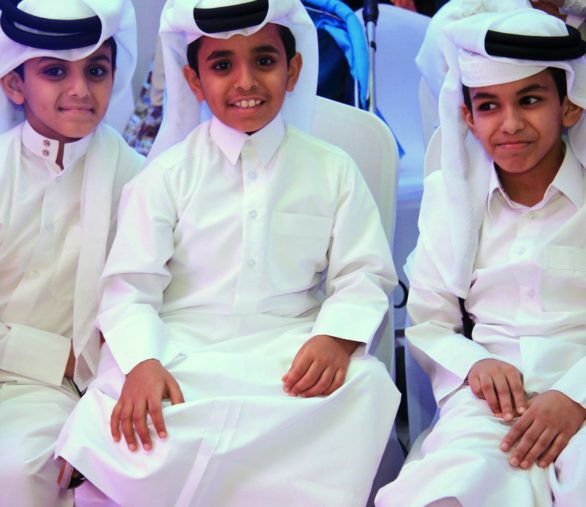
Qatar Olympic Committee
Photo for illustrative purposes only.
With reporting from Riham Sheble
Private school students in Qatar should say the national anthem every day and Qatari children should be allowed to wear their national attire instead of uniforms, hundreds of their parents have said in a recent survey.
The survey was conducted by the Childhood Cultural Center (CCC), which spoke to 700 Qatari parents with children in 20 private schools.
In an announcement this week, the CCC said it aimed to assess the effects of the anthem and national attire on students’ sense of identity.
It added that it was focusing on the private school system because half of all Qatari children are now enrolled in it.
Bolstering identity
According to the CCC, 92 percent of those surveyed wanted the recitation of the national anthem to become mandatory for all students in private schools.
About 8 percent said it should be optional.
Currently, all independent (public) school students and about a third of private schools surveyed already do this, the CCC found.
Another third of private schools said the anthem is recited only on special occasions, while a quarter never say it.

CCC/Twitter
Photo for illustrative purposes only.
Meanwhile, some 60 percent of Qatari parents favored allowing their children to wear national dress to school instead of uniforms.
This attire wasn’t defined in the survey, but presumably refers to thobes for boys and abayas for girls.
Currently, 81 percent of private schools in Qatar mandate their own uniform, while the rest allow Qataris to wear their national attire, the CCC said.
More than half (55 percent) of Qatari children in private school don’t wear national attire every day, parents said.
Some 17 percent wear it weekly, and about a quarter of those surveyed wear it only on occasion.
Recommendations
Based on its findings, the CCC recommended mandating that Qataris wear the national dress in private schools.
It added that others should have the choice to wear it instead of uniforms.

Karoly Czifra/Flickr
Photo for illustrative purposes only.
The CCC also urged private schools to ensure they are providing an educational and cultural framework that protects and strengthens Qatari culture.
This could be done through supporting curricula and activities, it said.
The recommendations come amid concerns that Qatari children are losing their language and identity, as 90 percent of the population is comprised of expats.































